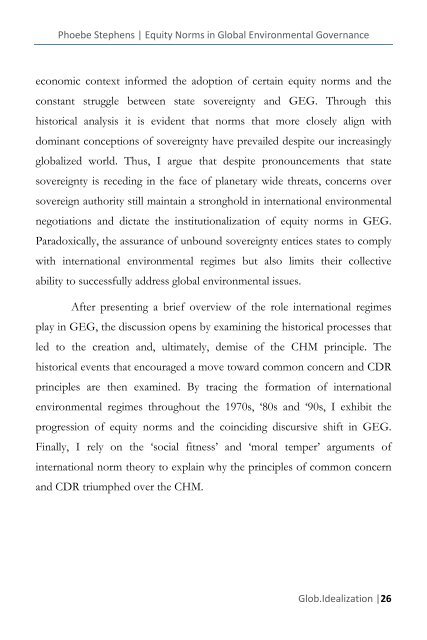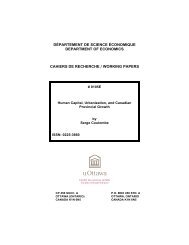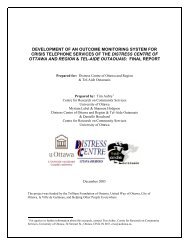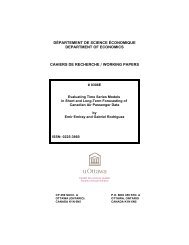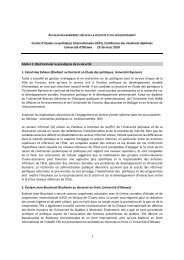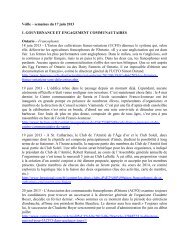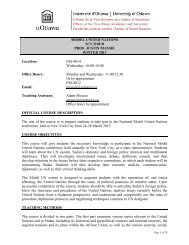- Page 1: GLOB.IDEALIZATION FALL / AUTOMNE 20
- Page 4 and 5: FORWARD This second issue of the Ca
- Page 6 and 7: REMERCIEMENTS | ACKNOWLEDGEMENTS La
- Page 8 and 9: TABLE DES MATIÈRES | TABLE OF CONT
- Page 10 and 11: Dan Herman | Polity Without Demos I
- Page 12 and 13: Dan Herman | Polity Without Demos a
- Page 14 and 15: The sum of its moving parts Dan Her
- Page 16 and 17: Dan Herman | Polity Without Demos f
- Page 18 and 19: Dan Herman | Polity Without Demos t
- Page 20 and 21: Dan Herman | Polity Without Demos n
- Page 22 and 23: Dan Herman | Polity Without Demos i
- Page 24 and 25: Dan Herman | Polity Without Demos A
- Page 26 and 27: Dan Herman | Polity Without Demos (
- Page 28 and 29: Conclusion Dan Herman | Polity With
- Page 30 and 31: Dan Herman | Polity Without Demos G
- Page 32 and 33: Phoebe Stephens | Equity Norms in G
- Page 36 and 37: Phoebe Stephens | Equity Norms in G
- Page 38 and 39: Phoebe Stephens | Equity Norms in G
- Page 40 and 41: Phoebe Stephens | Equity Norms in G
- Page 42 and 43: Phoebe Stephens | Equity Norms in G
- Page 44 and 45: Phoebe Stephens | Equity Norms in G
- Page 46 and 47: Phoebe Stephens | Equity Norms in G
- Page 48 and 49: Phoebe Stephens | Equity Norms in G
- Page 50 and 51: Phoebe Stephens | Equity Norms in G
- Page 52 and 53: Phoebe Stephens | Equity Norms in G
- Page 54 and 55: Phoebe Stephens | Equity Norms in G
- Page 56 and 57: Phoebe Stephens | Equity Norms in G
- Page 58 and 59: Phoebe Stephens | Equity Norms in G
- Page 60 and 61: Olivier Bégin-Caouette | Classemen
- Page 62 and 63: Olivier Bégin-Caouette | Classemen
- Page 64 and 65: Olivier Bégin-Caouette | Classemen
- Page 66 and 67: Olivier Bégin-Caouette | Classemen
- Page 68 and 69: Olivier Bégin-Caouette | Classemen
- Page 70 and 71: Olivier Bégin-Caouette | Classemen
- Page 72 and 73: Olivier Bégin-Caouette | Classemen
- Page 74 and 75: Olivier Bégin-Caouette | Classemen
- Page 76 and 77: Olivier Bégin-Caouette | Classemen
- Page 78 and 79: Olivier Bégin-Caouette | Classemen
- Page 80 and 81: Olivier Bégin-Caouette | Classemen
- Page 82 and 83: Olivier Bégin-Caouette | Classemen
- Page 84 and 85:
Grace Karram Stephenson | Internati
- Page 86 and 87:
Grace Karram Stephenson | Internati
- Page 88 and 89:
Grace Karram Stephenson | Internati
- Page 90 and 91:
Grace Karram Stephenson | Internati
- Page 92 and 93:
Grace Karram Stephenson | Internati
- Page 94 and 95:
Grace Karram Stephenson | Internati
- Page 96 and 97:
Grace Karram Stephenson | Internati
- Page 98 and 99:
Grace Karram Stephenson | Internati
- Page 100 and 101:
Grace Karram Stephenson | Internati
- Page 102 and 103:
James Wellstead | Universal Human R
- Page 104 and 105:
James Wellstead | Universal Human R
- Page 106 and 107:
James Wellstead | Universal Human R
- Page 108 and 109:
James Wellstead | Universal Human R
- Page 110 and 111:
James Wellstead | Universal Human R
- Page 112 and 113:
James Wellstead | Universal Human R
- Page 114 and 115:
James Wellstead | Universal Human R
- Page 116 and 117:
James Wellstead | Universal Human R
- Page 118 and 119:
Economic Flows James Wellstead | Un
- Page 120 and 121:
James Wellstead | Universal Human R
- Page 122 and 123:
James Wellstead | Universal Human R
- Page 124 and 125:
James Wellstead | Universal Human R
- Page 126 and 127:
James Wellstead | Universal Human R
- Page 128 and 129:
James Wellstead | Universal Human R
- Page 130 and 131:
James Wellstead | Universal Human R
- Page 132 and 133:
James Wellstead | Universal Human R
- Page 134 and 135:
James Wellstead | Universal Human R
- Page 136 and 137:
Megan Pickup | Challenging the WTO
- Page 138 and 139:
Megan Pickup | Challenging the WTO
- Page 140 and 141:
Megan Pickup | Challenging the WTO
- Page 142 and 143:
Megan Pickup | Challenging the WTO
- Page 144 and 145:
Megan Pickup | Challenging the WTO
- Page 146 and 147:
Megan Pickup | Challenging the WTO
- Page 148 and 149:
Megan Pickup | Challenging the WTO
- Page 150 and 151:
Megan Pickup | Challenging the WTO
- Page 152 and 153:
Megan Pickup | Challenging the WTO
- Page 154 and 155:
Megan Pickup | Challenging the WTO
- Page 156 and 157:
Megan Pickup | Challenging the WTO
- Page 158 and 159:
Megan Pickup | Challenging the WTO
- Page 160 and 161:
Verónica Rubio Vega | Post-crisis
- Page 162 and 163:
Verónica Rubio Vega | Post-crisis
- Page 164 and 165:
Verónica Rubio Vega | Post-crisis
- Page 166 and 167:
Verónica Rubio Vega | Post-crisis
- Page 168 and 169:
Verónica Rubio Vega | Post-crisis
- Page 170 and 171:
Verónica Rubio Vega | Post-crisis
- Page 172 and 173:
Verónica Rubio Vega | Post-crisis
- Page 174 and 175:
Verónica Rubio Vega | Post-crisis
- Page 176 and 177:
Verónica Rubio Vega | Post-crisis
- Page 178 and 179:
Verónica Rubio Vega | Post-crisis
- Page 180 and 181:
Verónica Rubio Vega | Post-crisis
- Page 182 and 183:
Alexandrine Cardin-Dubé | Quel sor
- Page 184 and 185:
Alexandrine Cardin-Dubé | Quel sor
- Page 186 and 187:
Alexandrine Cardin-Dubé | Quel sor
- Page 188 and 189:
Alexandrine Cardin-Dubé | Quel sor
- Page 190 and 191:
Alexandrine Cardin-Dubé | Quel sor
- Page 192 and 193:
Alexandrine Cardin-Dubé | Quel sor
- Page 194 and 195:
Alexandrine Cardin-Dubé | Quel sor
- Page 196 and 197:
Alexandrine Cardin-Dubé | Quel sor
- Page 198 and 199:
Alexandrine Cardin-Dubé | Quel sor
- Page 200 and 201:
Alexandrine Cardin-Dubé | Quel sor
- Page 202 and 203:
Alexandrine Cardin-Dubé | Quel sor
- Page 204 and 205:
Alexandrine Cardin-Dubé | Quel sor
- Page 206 and 207:
Glossary Nootan Kumar | The Evoluti
- Page 208 and 209:
Nootan Kumar | The Evolution of Con
- Page 210 and 211:
Nootan Kumar | The Evolution of Con
- Page 212 and 213:
Nootan Kumar | The Evolution of Con
- Page 214 and 215:
Nootan Kumar | The Evolution of Con
- Page 216 and 217:
Nootan Kumar | The Evolution of Con
- Page 218 and 219:
Nootan Kumar | The Evolution of Con
- Page 220 and 221:
Nootan Kumar | The Evolution of Con
- Page 222 and 223:
Nootan Kumar | The Evolution of Con
- Page 224 and 225:
Nootan Kumar | The Evolution of Con
- Page 226 and 227:
Nootan Kumar | The Evolution of Con
- Page 228 and 229:
Nootan Kumar | The Evolution of Con
- Page 230 and 231:
Nootan Kumar | The Evolution of Con


